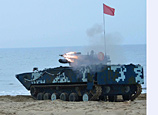
 |
| Zhang Wei, an official at the Beijing transport commission, displays statistics at a hearing on Thursday on a possible taxi-fare increase. WANG JING/CHINA DAILY |
Most participants at a public hearing supported the Beijing government's decision to increase taxi fares.
The hearing, held on Thursday afternoon, discussed the economic planning body's plan to address the taxi shortage in the capital.
Among the 25 participants, including lawmakers, political advisers, experts, taxi companies and drivers, only one participant opposed the reform plan, while the others said it was reasonable to increase fares, even though they had different opinions on how to achieve that.
On May 7, the Beijing Municipal Commission of Development and Reform released two proposals for the pricing reform plan: Taxi drivers will charge 13 yuan ($2) for a trip up to 3 km, plus an additional charge of either 2.3 yuan or 2.6 yuan for every kilometer beyond that.
The capital's current taxi fare system — 10 yuan within 3 km and 2 yuan for every additional kilometer — has been in place since 2006.
Seven people, mostly taxi drivers and taxi company managers, support an additional 2.6 yuan charge for every kilometer beyond 3 km, while another 13 people, mostly consumers, said they preferred the 2.3 yuan additional charge.
Three other people suggested the government should keep the current 10-yuan charge for the first 3 km of a trip, or combine the two plans.
Wang Limei, secretary-general of the China Road Transport Association, said the taxi sector provides special transportation and currently faces many obstacles, so a higher fare was reasonable.
Wang also called for scrapping the fuel surcharge to create easy and clear charges.
According to government proposals, the current 3-yuan fuel surcharge will be reduced to 1 yuan.
"I still think that the government and taxi companies should provide more subsidies to resolve the taxi shortage problem, rather than letting consumers pay," said Wu Ting, a consumer representative in the public hearing.
Wu was the only person who disagreed with the pricing plan. But other people also criticized the plan and came up with many suggestions to revise it.
Du Liqun, a member of the Beijing Municipal People's Congress, said the plan did not mention much about the responsibility of taxi companies.
The taxi shortage has been a problem in the capital, and many drivers complain that their income growth is lower than average in Beijing, making the industry less attractive.
The fare reform will mainly benefit taxi drivers, and each driver could earn an extra 1,400 yuan to 2,300 yuan a month, depending on the final plan, Lu Sufang, a spokeswoman for the Beijing Municipal Commission of Development and Reform, said in a previous report.
Li said on Thursday that the public hearing was an important part of the legal process to increase fares. The final decision will be made within 30 days of the public hearings.
The fare reform was only one of a series of measures made by the capital's government and it will consider comprehensive methods for better management of the taxi sector and better service for consumers, said Liu Yinchun, deputy head of the commission.
As of Thursday, the commission also received about 140 suggestions from local residents.
















 Post office demolished by 'mistake' overnight
Post office demolished by 'mistake' overnight


![]()
